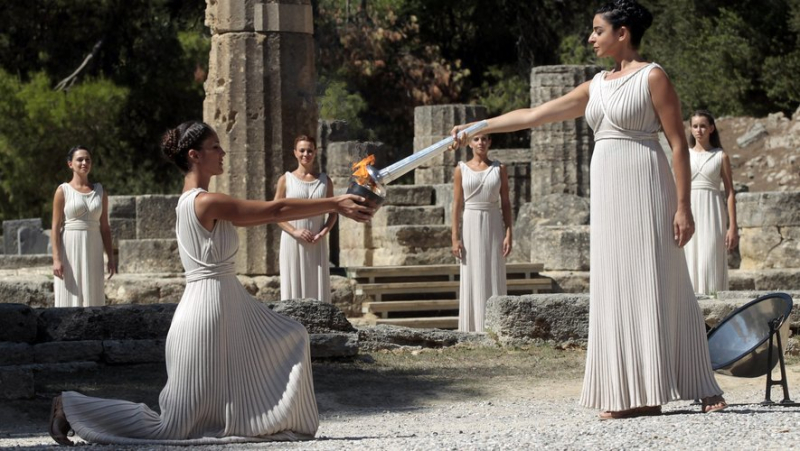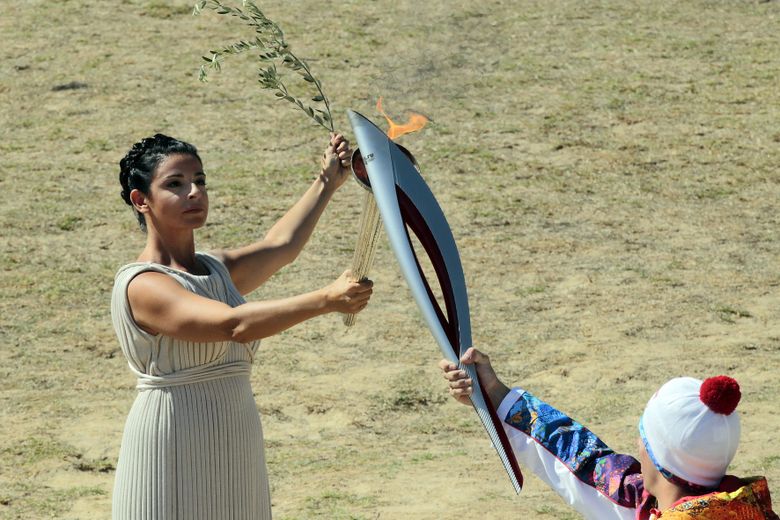Paris 2024 Olympics: between myths and religion, how the ancient Games were born in the sanctuary of Olympia

Every four years, the priestesses light the sacred fire with the help of the sun in the sanctuary of Olympia. ANA-MPA – ORESTIS PANAGIOTOU
Like every 4 years, priestesses will light the Olympic flame this April 16 in the Greek sanctuary of Olympia. A rite which did not exist in antiquity. Decryption with Montpellier resident Éric Perrin-Saminadayar, professor of history and epigraphy of the Greco-Roman world.
The Paris Olympics will come to life this Tuesday, April 16, 3,000 kilometers away in the sanctuary of Olympia. There, in the Peloponnese which is home to the main sanctuaries in the south-west of Greece, lies the source of Olympicism. Every four years, it is not a trickle of water but of smoke that brings it back to life.
This Tuesday, April 16, a High Priestess will light the flame for the next Summer Games in front of the Temple of Hera, at using a parabolic mirror capturing the sun's rays to guarantee the purity of the fire. For this she will implore the help of Apollo, god of light, then transmit the sacred fire to the first bearer of the flame. A gesture that launches the long relay towards Paris.

In Olympia, the priestess will transmit the sacred fire to the first torchbearer of Paris 2024. ANA-MPA – ORESTIS PANAGIOTOU
However, all this folklore did not exist more than sixteen centuries ago during the Olympia Games, as recalled by Éric Perrin-Saminadayar, professor of science and technology. rsquo;History and epigraphy of the Greco-Roman world and Director of the Faculty of Human Sciences and Environmental Sciences at Paul-Valéry.
"At Olympia, the fire was only lit for sacrifices"
"There has never been an Olympic flame in the games of Antiquity, explains the Montpellier resident. It is an invention of the modern era during the Amsterdam Olympics in 1928. At Olympia, the fire was not lit as for the sacrifices made as a preamble to sporting events. Because the big difference with today's Games is that it was then a religious celebration and the time devoted to worship exceeded ;elsewhere the one dedicated to sportsmen.
In fact, in Greece, the sacred fire burned permanently in each city within the home of Hestia. This was the case in Elis, the nearest city, and not in the sanctuary of Olympia.
"The main thing was… to win"
Other differences of size, as the history teacher reminds us, "the main thing was not to participate but to win to show that we came from a powerful city. The victors were entitled to honors equivalent to those given to the gods, even going so far as to tear down walls to allow them to enter the city."
Where the current Games, which have become Paralympics, are intended to be those of inclusion, those of Olympia were those of exclusion: reserved for Greeks and forbidden… nbsp;to women. Only Romans were accepted later.

Éric Perrin-Saminadayar, professor of History and epigraphy of the Greco-Roman world and Director of the Faculty of Human Sciences and Environmental Sciences at Paul-Valéry. Midi Libre – Richard Gougis
As for the genesis of what was then called a "competition", it is based on a myth :"That of a local king, Oenomaos, who had promised to marry his daughter to anyone who beat him in a chariot race in which the loser was put to death. But as he had an invincible team, the pretender regularly lost his life. Until young Pelops first seduced Hippodamia, the daughter of Oenomaos, who gave him the tools to beat his father, with the help of the god Poseidon. After winning the race and killing Oenomaos, Pelops, who will give his name to the Peloponnese, will decide to organize a great competition in Olympia to atone for his crime."
First Games in a stadium without stands
Another tradition attributes the creation of these games to the hero Heracles of Ida, one of the dactyls. What is certain is that they were born in 776 BC in a sanctuary dedicated to Hera then Zeus, known since the end of the 2nd millennium BC and located at the foot of Mount Cronion which sheltered a sacred grove.
The first games were played in a stadium without stands or embankments, in front of a sparse audience. But they marked a turning point in the history of Greece, a form of more rational explanation of their origin, according to the Montpellier specialist: " They serve as a bit of a year zero, like Jesus Christ for Christians. Before, for them, it was prehistory. This period coincides with the moment when the Greeks began to explore the Mediterranean, where writing was reinvented with the Greek alphabet, where a kind of identity was created and competitions were an integral part of it. ;.
Between 300 and 500 competitions see the light of day, including four dominant ones, a sort of “Grand Slam” circuit. : Olympia, Corinth, Delphi and Nemea.
"A strip of linen to hang on the temple"
The notion of an Olympic truce is then entirely relative. It only concerns athletes, pilgrims and followers, authorized to cross hostile terrain, but the fighting continues between warlike cities. "This year, the war in Ukraine does not is not going to stop any further", mischievously underlines Éric Perrin-Saminadayar, who reminds us that "the athletes had the obligation to be on site one month before the start of the events to train and above all to give the judges time to classify the athletes by categories because there was a competition reserved for young people."
Like any religious festival, the Games began with a procession starting from Elis, 35 kilometers away, and accompanying a hundred oxen towards the sacrifice on the sanctuary of Olympia. "There was no podium or ranking, only one winner per event, specifies the historian. The sacred athletes did not receive any money but received an olive wreath and a strip of linen or wool that they could hang in the temple dedicated to the gods."
Banned in 393 by the Roman emperor Theodosius
It is this religious dimension which pushed the Roman Emperor Theodosius in 393 to ban these Games which he considered pagan. In 426, the site of Olympia was then destroyed, buried under a layer of oblivion, then rediscovered in the 18th century.
Very quickly, the Olympic spirit tried to rise from its ashes… "The first attempt dates back to 1796-1798 , during the French Revolution with the Olympiad of the Republic, which lasted three years. There was another in England until Coubertin's initiative which initially aimed to highlight rather aristocratic elite sports such as tennis, shooting, etc. ;fencing then golf, rowing, sailing, horse riding."

The great dates in the history of the Olympic Games, from Olympia to Paris Midi Libre – Antoine Llop
They have since become more democratic, leaving the five rings to replace the gods on the altar of sport. But Éric Perrin-Saminadayar recalls that they "reinvented themselves as a means of bringing people together at a time when Europe was in tension , on the brink of the war of 14, all against a backdrop of colonial empires… The universal side of the games remains but the political dimension is still quickly catching up with that of sport, as we see with the war in Ukraine."
Another story with a slightly less sacred background of fire.
I subscribe to read more




